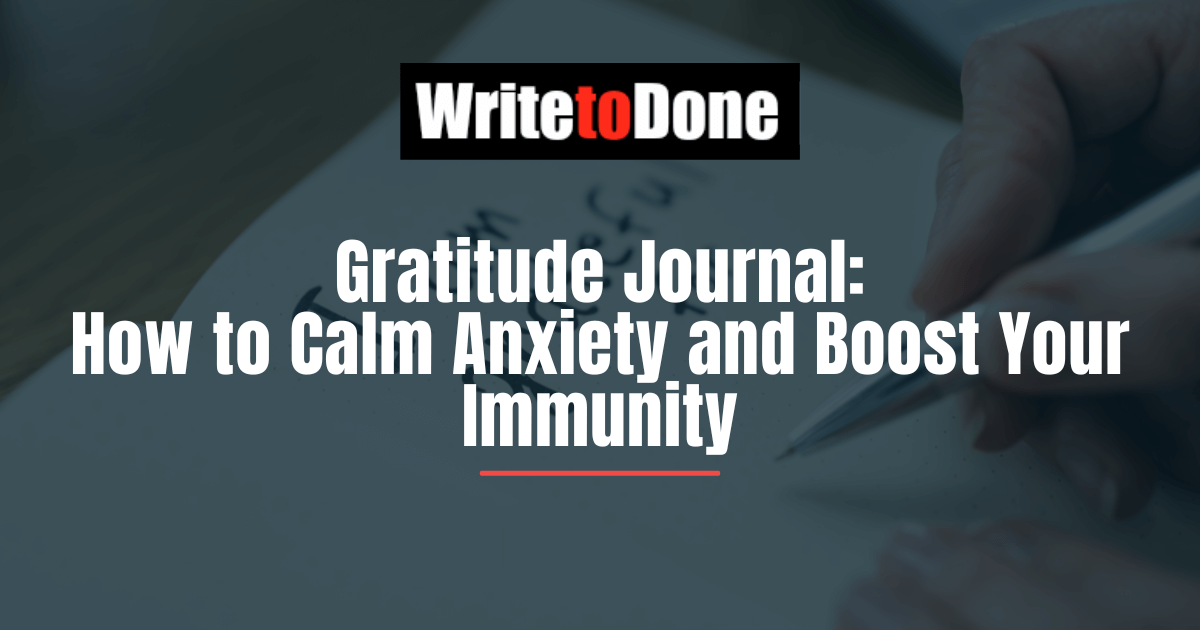Do you feel anxious about the future? What if you could decrease your anxiety by writing a gratitude journal?
In this article, you'll find a simple way to calm down and become more resilient, mentally and physically.
When you see bad news piling up, it’s easy to become anxious, especially if it is something like a pandemic which can change our lives.
You may notice that you don’t sleep well at night and toss and turn, thinking about what if scenarios.
Anxiety and sleeplessness cause stress. As you know, chronic stress can weaken your immune system. That’s why it’s important for your mental and physical health to find a way to relax, unwind, and feel more positive.
If you love writing, there is a great strategy you can use: to keep a gratitude journal. If you want to boost your mental and physical resilience, this is an easy way to create a positive force in your life,.
Why gratitude journals work
Gratitude is known as a ‘natural antidepressant.’ This emotion can even change the way our cells respond. Whenever we feel gratitude, our brain releases dopamine and serotonin, two neurotransmitters which make us feel ‘good.’ They make us feel happy from the inside.
By practicing gratitude every day, we create neural pathways which can create a permanent positive way of being.
Harvard University Medical Health School has this to say about gratitude:

Gratitude helps people feel more positive emotions, relish good experiences, improve their health, deal with adversity, and build strong relationships.
Keeping a gratitude journal is an easy way to focus on gratitude. It can be a time to recalibrate your emotions and to enter an oasis of peace even during a stressful day.
The Surprising Benefits of a Gratitude Journal
Using a gratitude journal has five distinct benefits:
Writing about gratitude lowers your stress levels.
As you reflect on gratitude, your level of cortisol (the stress hormone) decreases.
You will sleep better at night.
If you make writing in your gratitude journal a regular practice in the evening, you'll sleep better at night.
You will gain a new perspective of what you truly appreciate.
At times, it's easy to forget what really matters. Writing about what you are grateful for will clarify your values.
You are free to write anything without being judged.
Your gratitude journal is your private space where you can write anything you like. It is your me-time.
It can lift your mood when you feel blue.
Writing in your gratitude journal will lift your mood and make you feel happier
How to get the most of a gratitude journal

Here are answers to some questions people have about keeping a gratitude journal
What should my gratitude journal look like?
The Answer:
You can create a digital journal or us a paper notebook in which you write by hand. If you have a paper journal, keep it on your nightstand beside your bed so that you remember to write into it. I find that writing by hand is a powerful way of putting my thoughts on to the page.
What is the best time for writing in your gratitude journal?
The Answer:
The best time for writing in your gratitude before going to bed. Writing in the evening is a way to quiet your mind and to shape your thoughts before going to sleep.
What should I write about?
The Answer:
Look back at the day and write about five things you are grateful for. Maybe you are grateful for a person in your life or about something that happened. You may also be grateful for little things. Let your instinct guide you to find what you are grateful for.
How long should I write for?
The Answer:
Write between five and fifteen minutes, not longer. Try starting with just five minutes until you have established a new habit.
What to remember about keeping a gratitude journal

Keeping a gratitude journal can help you boost your mental and physical resilience and strengthen your immune system. If you want your body and mind to ward off ill health, use this tool.
Think about it as free medicine.
Please start your gratitude journal today so that you can feel happy, peaceful, and resilient.
















